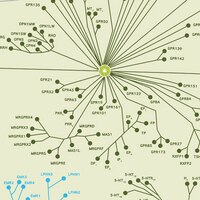Lysophospholipid G protein-coupled receptors.
Anliker, Brigitte and Chun, Jerold
J. Biol. Chem., 279: 20555-8 (2004)
2004
Show Abstract
The many biological responses documented for lysophospholipids that include lysophosphatidic acid and sphingosine 1-phosphate can be mechanistically attributed to signaling through specific G protein-coupled receptors. At least nine receptors have now been identified, and the total number is likely to be larger. In this brief review, we note cogent features of lysophospholipid receptors, including the current nomenclature, signaling properties, development of agonists and antagonists, and physiological functions. | 15023998
 |
Ligand-dependent inhibition of B16 melanoma cell migration and invasion via endogenous S1P2 G protein-coupled receptor. Requirement of inhibition of cellular RAC activity.
Arikawa, Kayo, et al.
J. Biol. Chem., 278: 32841-51 (2003)
2003
Show Abstract
We investigated mechanisms for inhibition of B16 melanoma cell migration and invasion by sphingosine-1-phosphate (S1P), which is the ligand for the Edg family G protein-coupled receptors and also implicated as an intracellular second messenger. S1P, dihydro-S1P, and sphingosylphosphorylcholine inhibited B16 cell migration and invasion with the relative potencies expected as S1P2 receptor agonists. The S1P2-selective antagonist JTE013 completely abolished the responses to these agonists. In addition, JTE013 abrogated the inhibition by sphingosine, which is the S1P precursor but not an agonist for S1P receptors, indicating that the sphingosine effects were mediated via S1P2 stimulation, most likely by S1P that was converted from sphingosine. S1P induced inhibition and activation, respectively, of Rac and RhoA in B16 cells, which were abrogated by JTE013. Adenovirus-mediated expression of N17Rac mimicked S1P inhibition of migration, whereas C3 toxin pretreatment, but not Rho kinase inhibitors, reversed the S1P inhibition. Overexpression of S1P2 sensitized, and that of either S1P1 or S1P3 desensitized, B16 cells to S1P inhibition of Rac and migration. In JTE013-pretreated, S1P3-overexpressing B16 cells, S1P stimulated cellular RhoA but failed to inhibit either Rac or migration, indicating that RhoA stimulation itself is not sufficient for inhibition of migration. These results provide compelling evidence that endogenously expressed S1P2 negatively regulates cell motility and invasion through ligand-dependent reciprocal regulation of cellular Rac and RhoA activities. In the presence of JTE013, S1P instead stimulated Rac and migration in B16 cells that overexpress either S1P1 or S1P3, unveiling counteractions between S1P2 and S1P1 or S1P3 chemotactic receptor. | 12810709
 |
Differential coupling of the sphingosine 1-phosphate receptors Edg-1, Edg-3, and H218/Edg-5 to the G(i), G(q), and G(12) families of heterotrimeric G proteins
Windh, R T, et al
J Biol Chem, 274:27351-8 (1999)
1999
| 10488065
 |
















